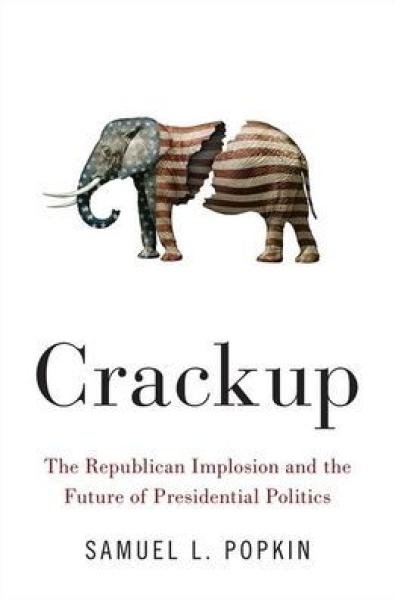Description
In Crackup, the eminent American politics scholar Samuel L. Popkin tells the story of how the Republican Party fractured into uncompromising groups with irreconcilable demands. Changes in campaign finance laws and the proliferation of mass media opened the way for newly energized groups to split the
party. The 2002 "McCain-Feingold" campaign finance reform bill aimed to weaken the power of big corporations and strengthen political parties by ending corporate donations to the parties. Instead, it weakened legislative leaders and made bipartisanship toxic.
Popkin argues that moving money outside the political parties fueled the rise of single-issue advocacy groups and Super PACs funded by billionaires with pet issues. This allowed self-promoting politicians to undermine colleagues with an unprecedented use of tactics once only used to disrupt the
other party. One such politician was Ted Cruz, who effectively promoted himself at the expense of the party, mobilized other obstructionists in Congress, and blocked compromises on immigration and healthcare. Into this abyss came Donald J. Trump, who took advantage of the party's inability to do
anything for Republican voters struggling with economic decline. No other candidate, when forced to try to satisfy the irreconcilable demands of major donors and party leaders, could offer a credible alternative to his moon-promising bravado.
A gripping structural explanation of why the GOP ended up with Trump as their standard bearer, Crackup forces us to look at the deeper forces set in motion two decades ago. It also reveals how self-fashioned rebels like Cruz are inevitable given the new rules of the game. Unless the system for
financing elections changes, we will continue to see opportunists emerge-in both parties-to block intra-party compromise.
"In 2016, a businessman so discredited that he could no longer get a casino license or borrow money from an American bank was elected President of the United States of America. How did this happen? It is easy to mock and ridicule Donald Trump as if he is the problem. In fact, he is a symptom of a much larger issue that has been bedeviling the GOP for nearly two decades: an intraparty crackup of massive proportions. By "crackup," I mean a breakdown of the fragile alliances between coalitions within a party that prevents its leaders from developing goals they can deliver on when they control the White House and majorities in the House and Senate. This introductory chapter explains why party crackups are inevitable in a federal system with national money and local primaries. But this is the first time -- for either party - that no group within the party could create a synthesis of old orthodoxies and new realities that altered the party's direction enough to build a new consensus"--
"What the hell happened to the GOP? Is something just as destructive in store for the Democratic Party? The answers Popkin offers-part post-mortem, part prescription - are as shrewd as they are urgent." -- Jill Lepore, author of These Truths
"Crackup brilliantly confirms why Popkin is one of the most respected political observers of our time. Not only a keen, precise explanation of how Washington unraveled, this is a thrilling examination of overlooked decisions and hidden dramas. I started highlighting the text and gave up because
every page is overflowing with insights, analysis, and detail. This book is permanently installed on my desk." -- Evan Osnos, Staff Writer, The New Yorker
"Popkin performs two distinct and important services in his book. First, in a thoughtful narrative with which I agree completely, he provides a much-needed corrective to the failure to understand the critical omnipresence of well-functioning political parties to the success of democratic government.
Second, he provides a logical, well-argued explanation of why the system is malfunctioning with which I differ, and which I welcome." -- Barney Frank, former member of the US House of Representatives
"Popkin writes with verve and good humor, knows a whole lot about politics, and is gifted at mobilizing a good story to make a point. If you are like me, you will disagree with him in fundamental ways but still appreciate the ride Popkin takes you on - and know you'd enjoy arguing with him late into
the night." -- E.J. Dionne Jr, author of Code Red
"Popkin, one of the nation's foremost scholars of elections, has written an indispensable book explaining the conflicts within the Republican Party that led to the election of Trump. No one is better equipped to describe this history of collapse, and he does so with rigor and grace." -- Thomas B.
Edsall, Contributing Opinion Writer, The New York Times
"Popkin's brilliant book could not be more timely. Crackup masterfully diagnoses the descent of the Republican Party from 'comity to carnage, ' while reminding us that no political party is immune to the dynamics of breakdown." -- Sarah Binder, Professor, George Washington University
"Popkin artfully traces the financial consequences of McCain-Feingold and Citizens United. He has written an important book on an important topic and it should be read by anyone interested in contemporary American politics." -- Mathew D. McCubbins, Professor, Duke University
Product Details
- Oxford University Press, Brand
- May 19, 2021 Pub Date:
- 0190913827 ISBN-10:
- 9780190913823 ISBN-13:
- 368 Pages
- 9.4 in * 6.4 in * 1.3 in Dimensions:
- 1 lb Weight:




